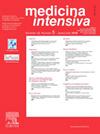Esfuerzos respiratorios inefectivos y sus potenciales consecuencias durante la ventilación mecánica
IF 3.1
4区 医学
Q2 CRITICAL CARE MEDICINE
引用次数: 0
Abstract
The implementation of invasive mechanical ventilation (IMV) in critically ill patients involves two crucial moments: the total control phase, affected among other things by the use of analgesics and sedatives, and the transition phase to spontaneous ventilation, which seeks to shorten IMV times and where optimizing patient-ventilator interaction is one of the main challenges. Ineffective inspiratory efforts (IEE) arise when there is no coordination between patient effort and ventilator support. IIE are common in different ventilatory modes and are associated with worse clinical outcomes: dyspnea, increased sedation requirements, increased IMV days and longer intensive care unit (ICU) and hospital stay. These are manifested graphically as an abrupt decrease in expiratory flow, being more frequent during expiration. However, and taking into consideration that it is still unknown whether this association is causal or rather a marker of disease severity, recognizing the potential physiological consequences, reviewing diagnostic methods and implementing detection and treatment strategies that can limit them, seems reasonable.
机械通气过程中无效的呼吸力及其潜在后果
在危重患者中实施有创机械通气(IMV)涉及两个关键时刻:总控制阶段,受镇痛药和镇静剂的使用等因素的影响,以及向自发通气的过渡阶段,该阶段旨在缩短IMV时间,优化患者与呼吸机的相互作用是主要挑战之一。当患者努力和呼吸机支持之间没有协调时,会出现无效的吸气努力(IEE)。IIE常见于不同的通气模式,并与较差的临床结果相关:呼吸困难、镇静需求增加、IMV天数增加、重症监护病房(ICU)和住院时间延长。这些症状表现为呼气流量突然减少,在呼气时更频繁。然而,考虑到尚不清楚这种关联是因果关系还是疾病严重程度的标志,认识到潜在的生理后果,审查诊断方法并实施可以限制它们的检测和治疗策略似乎是合理的。
本文章由计算机程序翻译,如有差异,请以英文原文为准。
求助全文
约1分钟内获得全文
求助全文
来源期刊

Medicina Intensiva
CRITICAL CARE MEDICINE-
CiteScore
2.70
自引率
20.00%
发文量
146
审稿时长
33 days
期刊介绍:
Medicina Intensiva is the journal of the Spanish Society of Intensive Care Medicine and Coronary Units (SEMICYUC) and of Pan American and Iberian Federation of Societies of Intensive and Critical Care Medicine. Medicina Intensiva has become the reference publication in Spanish in its field. The journal mainly publishes Original Articles, Reviews, Clinical Notes, Consensus Documents, Images, and other information relevant to the specialty. All works go through a rigorous selection process. The journal accepts submissions of articles in English and in Spanish languages. The journal follows the publication requirements of the International Committee of Medical Journal Editors (ICMJE) and the Committee on Publication Ethics (COPE).
 求助内容:
求助内容: 应助结果提醒方式:
应助结果提醒方式:


